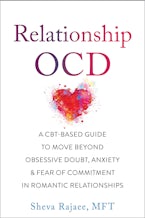As a therapist specializing in the treatment of anxiety disorders and obsessive-compulsive disorder (OCD), I hear this question at least once a day, if not more. Clients are curious if they should tell their loved ones the details of their intrusive thoughts; thoughts like, “You want to hit that pedestrian we just passed,” “I’m a pedophile,” or, “I don’t feel attracted to you today and I’m worried this means I’m not truly in love.” They hope to gain a sense of reassurance by sharing these thoughts, or else feel guilty for not sharing what they believe may be their inner truth.
When working with clients, I always advise the sharing of PROCESS not CONTENT when it comes to intrusive thoughts. This means encouraging them to share with parents/partners/friends when they are anxious or afraid so they may access support, but to avoid the details or content of their obsessions.
A sample conversation may look like:
Spouse: You seem really anxious today. What’s on your mind?
Client: You’re right, I’m spiraling right now but I don’t want to share the details because I know that would be reassurance-seeking.
Spouse: Are you sure? Maybe it would help you feel better to say it out loud?
Client: I know you want to help, and I appreciate you being here, but sharing the details isn’t the right thing for my recovery. Can you give me a hug instead? Sharing obsessional content all too frequently ensnares loved ones into compulsive behavior, and leaves the entire team frustrated and overwhelmed. Conversely, sharing process allows our clients to gain much-needed support and cheerleading as they do the difficult but transformative task of tolerating discomfort and managing anxiety all on their own.
Sheva Rajaee, MFT, is founder and director of The Center for Anxiety and OCD in Irvine, CA, where she manages a team of clinicians specializing in the treatment of anxiety disorders and obsessive-compulsive disorder (OCD). She is a member of the California Association of Marriage and Family Therapists (CAMFT) and the International OCD Foundation (IOCDF). She has spoken about her own OCD journey in a 2017 TEDxUCLA Talk. She has appeared on CNN, been interviewed in HuffPost, and has been featured on multiple episodes of The OCD Stories podcast and other anxiety and mental health podcasts.



